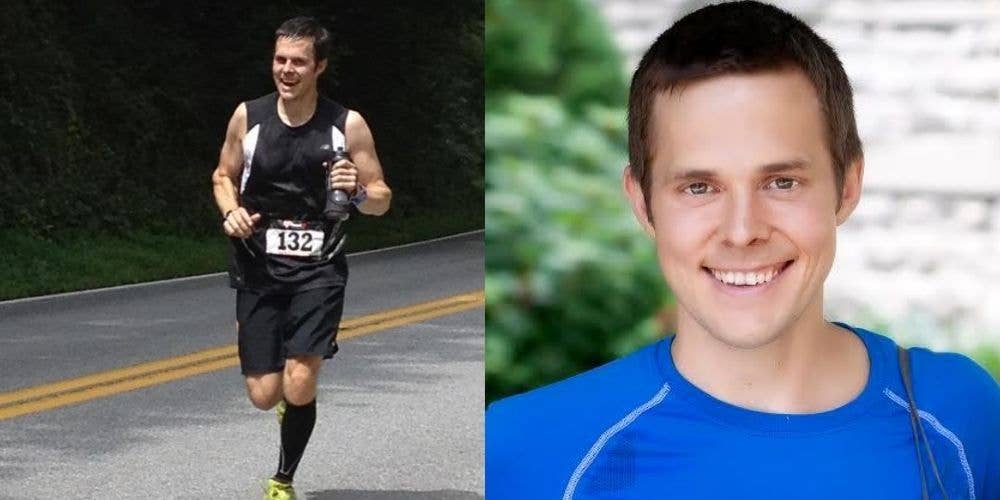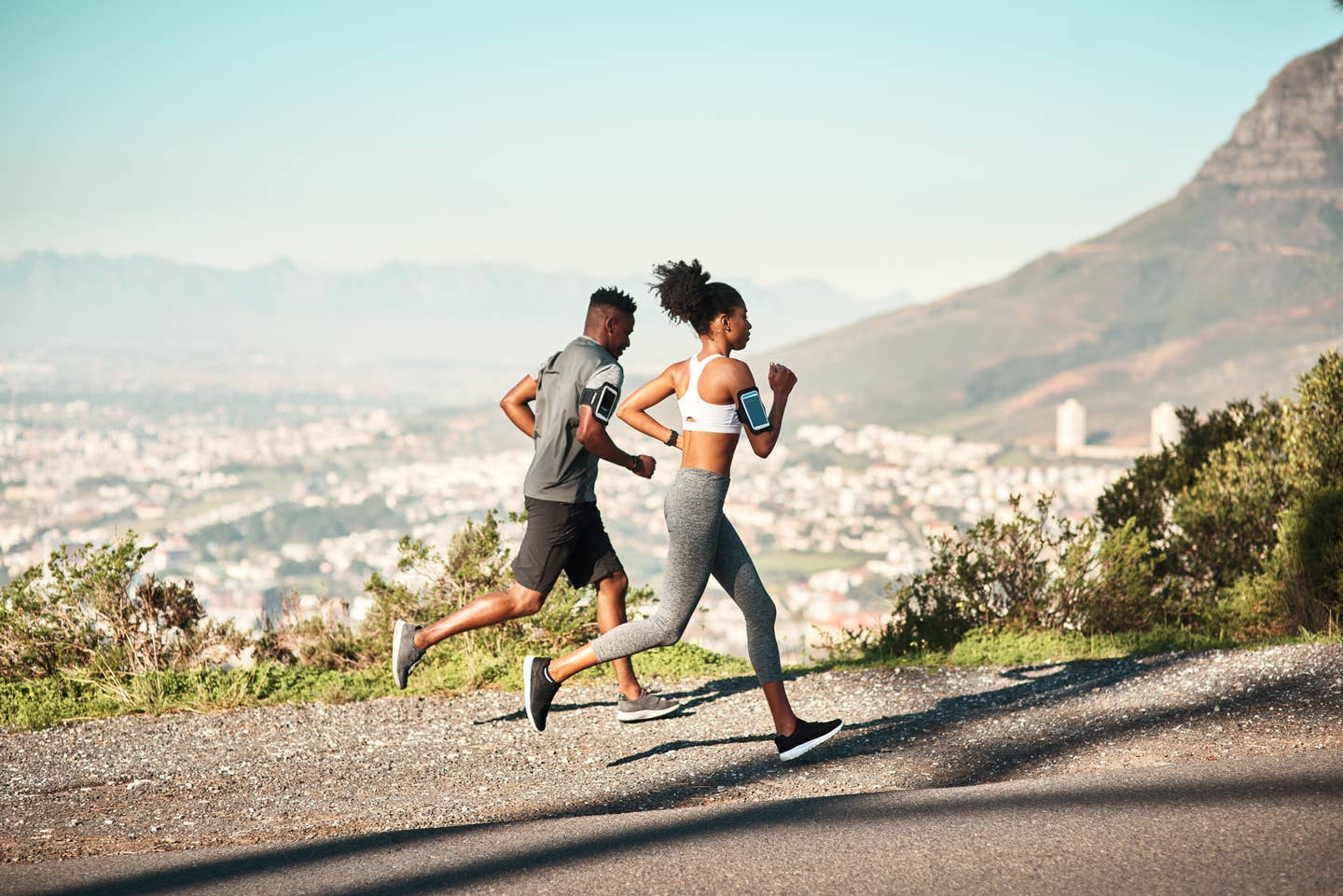
Ultra-Marathoner Matt Frazier on How He Fuels Up as a Plant-Based Athlete
Matt Frazier is an ultra-marathoner and founder of No Meat Athlete, which began as a personal blog 11 years ago and has since grown into a platform that reaches hundreds of thousands of readers and listeners every month via the website, podcast, and social channels. No Meat Athlete has also gone off-line with 100 running clubs across the country and at least seven uber-fans donning its running carrot logo as tattoos.
Frazier is also an author of No Meat Athlete: A Plant-Based Nutrition and Training Guide for Every Fitness Level-Beginner to Beyond and The No Meat Athlete Cookbook: Whole Food, Plant-Based Recipes to Fuel Your Workouts—and the Rest of Your Life. His third book, co-authored with vegan bodybuilder Robert Cheeke, tentatively titled The Plant-Based Athlete is slated for release spring 2021. The larger umbrella of No Meat Brands also includes 80/20 Plants, a plant-based diet coaching service; and Love Complement, which eschews the word “supplement” but sells add-ons for plant-based diets.
Here, in an exclusive interview with The Beet, Frazier talks about his gradual approach to veganism, how his plant-based diet helped him achieve his fitness goals and can for you too, and how feeding a plant-based diet to his children has helped his awareness evolve. We think his advice will inspire you to nurture your body with a plant-based diet even as you work toward your fitness goals, whether they’re ambitious or part of a daily healthy lifestyle.
TB: What inspired you to go vegetarian and then vegan?
Matt Frazier: It started as an ethical thing. I was raised eating a standard, omnivorous, American diet. In 2009, when I started to go vegetarian, I was training for the Boston Marathon. I was not thinking [vegetarianism] was a nutritional upgrade. I had a dog, and I really connected with him. I started to think about other animals and how they are not that different. I wasn’t sure I could be a good athlete and not eat animals. I started out cutting out red meat. Then pork. I cut out four-legged animals first. … I started to think there was something to this. Then I started removing dairy. I was just doing it in little phases. I became vegan in 2011.
TB: How did changing your diet affect your training?
MF: When I first became vegetarian, I had already cut 90 minutes off my first marathon time. I was still 10 minutes away from the Boston Marathon qualifying time. I had plateaued, and I was not sure how I was going to find 10 minutes. [Plant-based eating] was what I was missing. That’s what it took. The other big noticeable difference to me was I stopped getting injured. Injuries had always been a big part of my running journey. When I became vegan, it was around the time I ran three 50-milers and a 100-miler. I didn’t have any injuries. If it’s done right, [plant-based diets] can really help you recover faster.
TB: What do you wish you knew when you were starting out?
MF: I wish I would have paid more attention to the need to supplement, particularly B12. I went probably two or three year after becoming vegetarian and one year after being vegan, and I thought I was really sick. When I went to doctors, they didn’t know what was wrong. No one ever said, “Have you tried B12?” I should have done that. I would have avoided a lot of mental stress for me. It’s such an easy fix.
TB: What advice do you have for someone who wants to start?
MF: It really depends on your level of motivation and your reasons for it. If you’re really excited about eating a plant-based diet, it’s worth trying it and seeing what it’s like. What I think happens though is so many people try it, it doesn’t work, and they conclude [plant-based diets] are way too hard. I think the small-steps approach is the only way to make things last. There’s lots of research about habit change that says smaller changes preserve your willpower. Then you have more experience before you get to the point where it gets hard.
TB: How has your approach to this diet changed over the past decade?
MF: I’m into experimenting, and if it doesn’t work, it’s ok. If I messed up my running, I was okay with the risk. Since I’ve had kids, I’ve felt somewhat different because I’m the one making the choice for someone else. My kids are both really talented athletes. They love that they eat plant-based, and we’ve talked to them about it their whole lives. I’m not willing to take risks with them, so I spend more time thinking about the perfect food recipes for them.
Yes, this diet is different. But if you’re taking your kids to eat fast food twice every week, you probably need to think more about that. When I think about all the other things they could be eating, it gives me a lot of confidence in this diet. It’s hard to screw up if you’re focusing on eating whole foods.
TB: What has been your biggest evolution in thinking about the connection between veganism and fitness?
MF: In the past couple of years, I’ve come to appreciate fitness that’s incorporated into everyday life. The Boston Marathon had been this impossible thing that I worked at over seven years, and I finally did it. Then the 100-miler was this impossible thing, and I did that. I went two to three years after that waiting for inspiration to strike, to find the next goal. Then, I started playing soccer and the most fun I have each week is a soccer pick-up game. We live in North Carolina and walking my dog I get in a lot of good hills. Between soccer, walking the dog, and martial arts, those daily practices turn out to be a good bit of fitness.
TB: What’s your best advice for athletes who eat a plant-based diet?
MF: I would say the big tip — and this is a theme in the upcoming book, The Plant-Based Athlete — is getting enough calories and the right kind of calories. A lot of times when people switch overnight and don’t give themselves a chance to learn, they’ll replace meat with vegetables, salad, and greens. When you do that, you might be losing 30% of your calories. Then, their energy level is really low. What you should experience, if you’re doing it right, is feeling more energetic.
TB: What have been the biggest advantages of a plant-based diet for you?
MF: The immediate thing for me was energy. From day one of being vegetarian, from hour one, I felt a tremendous amount of energy.
The long term advantage that’s been more impactful is that eating this way forced me to start thinking about the food I was eating. Ten years ago, when I started doing this, there were not a lot of plant-based meat alternatives, so I had to plan ahead. I had to drink a smoothie before I went to a party because I knew I was not going to eat a meal there. If we went on a road trip, which we did every couple of months, we planned ahead to bring fruit and trail mix. A plant-based diet wasn’t as convenient back then. It taught me so much about food and nutrition. Now my relationship with food is not based on food being entertainment, but nourishment.
TB: What is your mantra?
MF: There’s a poster hanging in my office with a quote from author Seth Godin that says, “Pick yourself.” What he means there is stop waiting to be discovered. Stop waiting for the right person to discover you to write that book or be on a TV show. You can start putting things out into the world, let people find you, and let them decide if it’s good or not. That’s always been a mantra of mine. It can mean the same thing in diet and life as well.
I could have run that first marathon and missed my goal time by 104 minutes and thought, “It was really stupid to think I was going to get anywhere near that right now.” And never run a marathon ever again. Under normal wisdom, I was never going to qualify for that marathon. But I said, what if I made a radical change to the way I ate? And the way I trained? I think … conventional wisdom is for people who decide to be average. If you’re willing to weigh more [in your thought process] than anyone else would consider reasonable or sane, in pursuit of something, you can make it happen.
Matt’s High-Calorie Smoothie for Athletes (That’s Good Enough for His Kids)
Ingredients
- 1 brazil nut
- 1 tablespoon flax seeds
- 1/4 cup silken tofu, organic non-GMO
- 3 pitted medjool dates, soaked
- 1 tablespoon cacao powder
- 1 tablespoon cacao nibs
- 2 tablespoons Complement Protein
- 2 tablespoons peanut butter
- 1 large, very ripe frozen banana
- 3/4 cup ice
- 1 1/2 cups unsweetened almond milk
Instructions
- Combine all ingredients in a high-powered blender and blend until smooth. Makes 28 ounces.
More From The Beet






